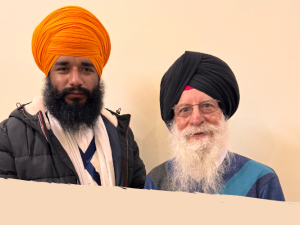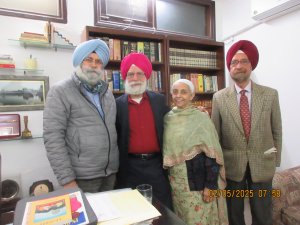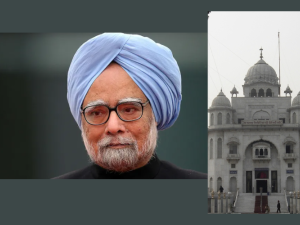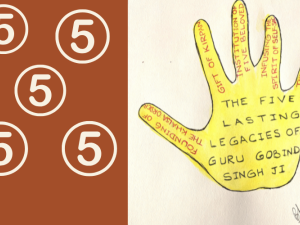The Jung Center, a prestigious organization had invited Sikh Scholar Prof. Simran Jeet Singh on November 4th at 6:00 pm, for a talk based on his book “The Light we Give”. The Jung Center has served as a nonprofit forum for dynamic conversations on a diverse range of psychological, artistic, and spiritual topics. Simran is a professor of history at the historic Union Theological Seminary and national bestselling author of The Light We Give: How Sikh Wisdom Can Transform Your Life. He is Senior Advisor for the Aspen Institute’s Religion and Society Program and also hosts Wisdom & Practice, a new podcast by The Aspen Institute and PRX and a contributor to TIME Magazine.
The program started with reception at the Jung Center. Then at 7:00 PM the attendees were ushered to Brown Auditorium, of Museum of Fine Arts, Houston on 1001 Bissonnet Steet. The talk started at 7:30 PM with an Introduction and welcoming of the Speaker by the Secretary of The Jung Center. Then Simran took the podium and started his talk. He gave an account of his early childhood years growing up in San Antonio, Texas, with the only one in his class with Patka on his head. He shared how during one junior league soccer game the Referee asked him to remove his Patka, as he wanted to make sure that nothing was hidden under it. Then he shared about the locker room incident, where one of his teammates pulled his Patka, and how he pounced on him in revenge. These two incidents of humiliation
and revenge made him think deeply about the approach to such future awkward situations and how make it educational cum learning experience for the perpetuator. He talked in detail about 9/11 incident when two hijacked planes crashed into the World Trade Center in New York City, killing thousands of people and causing the collapse of the Twin Towers in New York that impacted their lives. He also mentioned when Balbir Singh Sodhi was killed outside his gas station in Mesa, Arizona, four days after the incident for the retribution, by falsely assuming the Sikhs responsible for the attack. He shared about another incident, when his mother took him along with his brothers to a roller skate rink, and she was yelled at by the manager and called terrorist.
Spurred by the incidents of such traumatic nature, then diving into his own roots cultivated by his parents, finally propelled him to become an activist. He shared from the stage that generally people are kind. But if you watch and believe what is shown on TV, then the impression is that the people are horrible. This great human trait is the hope for mankind. He added that this is what active kindness is in life. As you see these random acts of kindness, you can see hopes springing from there. He concluded his talk by adding, “We can have sweetness no matter what happens.” He asked the audience to embrace that reality in life. The talk was followed by an engaging Q & A session. Overall, the session was very planned, executed and received by the audience. This is also a showcase on how the minorities should strive to participate and be heard by the majority.








